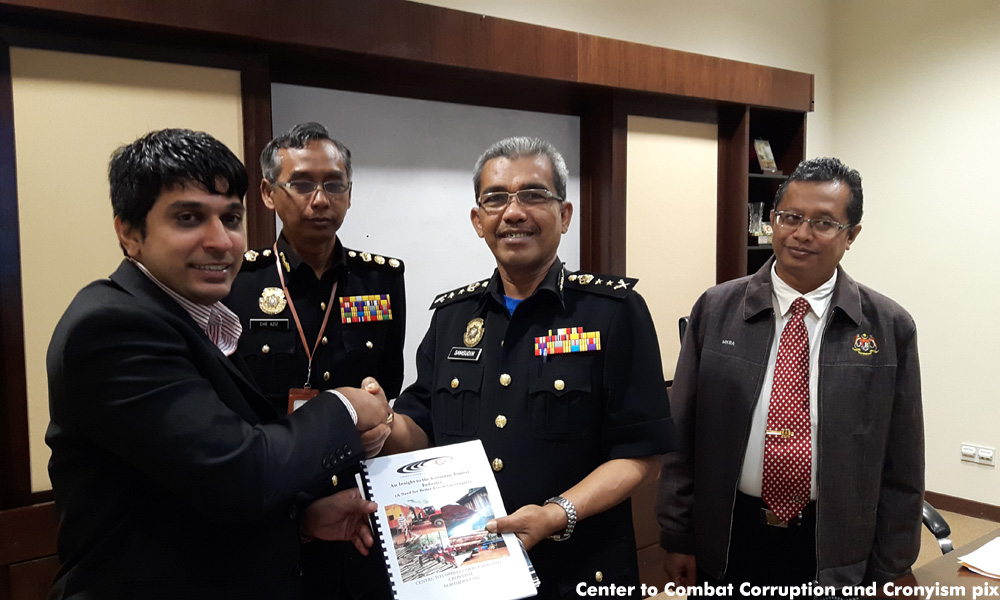The story of illegal logging and the timber trade is often a story of violence, killings corruption and money-laundering. It is estimated that up to 25 percent of wood products from East Asia and the Pacific may be produced from illegally harvested wood (Chattam House).
The timber trade in Malaysia has long been a subject of massive controversy. While easily one of the fastest revenue generating industry, it is also one of the most destructive to the environment, causing untold disasters and loss of natural resources, habitats and endangered species.
In trying to better understand the root causes of the massive floods that washed away thousands of homes and many lives primarily in the state of Kelantan early 2015, the Centre to Combat Corruption & Cronyism (C4) embarked on a mission to fact-find, gather information and pose recommendations for better policies at forest governance with related stakeholders both at federal and state levels.
At the outset, we acknowledge that Kelantan is not the only state that have massive issues with timber felling, in Malaysia. A wide spectrum of people was interviewed during the mission, including loggers, indigenous people, the Orang Asli affairs department (Jakoa), state government officials and politicians.
Among the recommendations made were:
- The urgent need for greater accountability and transparency in the procedures and regulatory mechanisms of the timber trade.
- Increase of enforcement officials within the forestry department to monitor and take action against loggers acting without legal permits.
- Forestry departments should be transparent about licences issued, concessions and the awarding of contracts.
- Enhance surveillance tools to detect illegal logging in remote areas.
- Protect the rights and livelihood of the indigenous peoples.
- The Malaysian Anti-Corruption Commission (MACC) to better engage with whistleblowers and local communities and produce data available to the public of corrupt offenders in the industry.
- Central management of logging affairs, to peg bureaucratic loopholes.
The full report was launched and can be found here.
We are pleased to report that the report was handed over by members of our Northern Unit on a follow up visit (May 16-18 May) to
1. The Deputy menteri besar of the Kelantan state government, YB Mohd Amar Abdullah. He was very open and agreed to look into the recommendations of the report. He also accepted to consider a proposal to enact policies on access to information in the state.
 2. Director of the Malaysian Anti-Corruption Office in Kelantan, Moh Samsudin Yusof, who expressed keenness to work with us in finding long-term solutions for the industry, which is riddled with allegations of fraud and corruption. A proposal roundtable meeting to discuss recommendations with various stakeholders, was principally agreed upon.
2. Director of the Malaysian Anti-Corruption Office in Kelantan, Moh Samsudin Yusof, who expressed keenness to work with us in finding long-term solutions for the industry, which is riddled with allegations of fraud and corruption. A proposal roundtable meeting to discuss recommendations with various stakeholders, was principally agreed upon.
3. State Forestry Director Zahari Ibrahim. During the meeting, Zahari shared his ministry’s challenges in handling the issue. Zahari agreed with us that middle men are a big part of the problem, and pledged cooperation.
C4 Centre welcomes the positive and open attitude of the Kelantan State government in addressing a longstanding problem, and acknowledged the importance of working with civil society and affected communities in bringing longer lasting solutions on this shared common agenda.
The problems with the timber trade are complex, enforcement is dangerous , but most important is the need for political will to cut corruption and establish proper regulatory mechanisms to ensure sustainable forest governance.
Is Malaysia ready to meet this challenge?
K SUDHAGARAN STANLEY is northern region coordinator, Centre to Combat Corruption and Cronyism (C4).

